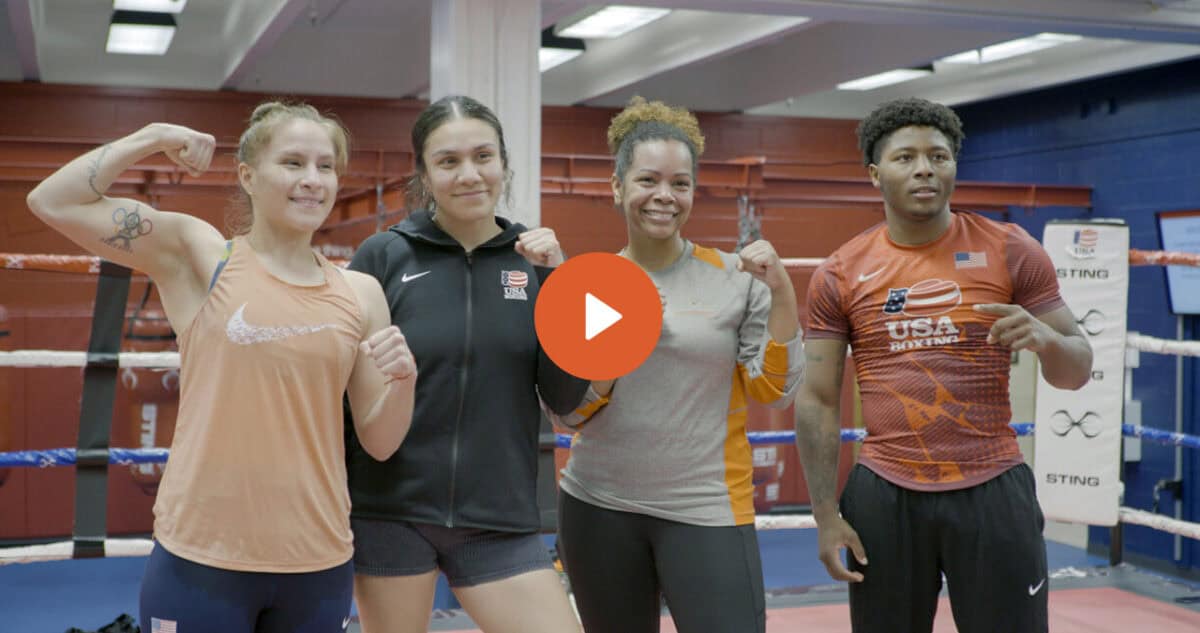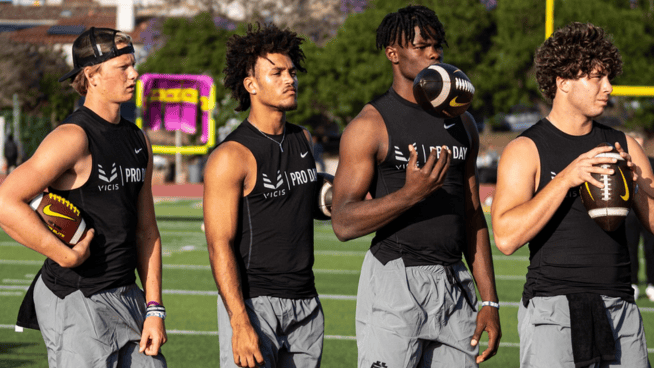What ‘Pressure’ Really Means For Athletes—And How Great Coaches Take it Away
“Man, there is so much pressure!”
“Don’t choke under the pressure!”
Pressure is a common point of interest in sports. It’s something that’s talked about all the time, yet many of us don’t operate with the same definition of pressure.
In my opinion, the most accurate way to view pressure is this: Pressure is the difference between the expectations placed upon you and your perceived abilities. It can even be written as a simple math equation:
Pressure = Expectations – Perceived Ability
Why do I like using this definition with athletes?
If you know you can accomplish something, there is no pressure on you. For example, if I told you to complete a 4th grade Math exam, and you only needed a 50% to pass, would you feel much pressure? Probably not.
In the world of sports, say you’re a soccer player who goes out to play a pick-up game with friends. Do you feel pressure to perform in that environment? In the vast majority of cases, no. Because you know you can play soccer, and you’re doing it in an environment where no one will even remember the result the next day. The expectations are low, and you know you have the ability to play the sport at that level.
But take that same soccer game and put yourself in a high school championship environment or your first university/college start. Is there pressure now? It’s a lot more likely. This is an environment you likely haven’t experienced before, and the expectations are high. You may ask yourself, am I good enough to perform here? Odds are, you’ll feel pressure in these situations.
Pressure = Expectations – Perceived Ability
With this equation in mind, how do we rise above pressure in big-game situations?
If we go back to the 4th grade math test example, we felt no pressure because our perceived ability was higher than the expectations. We knew we could get it done because we had done so before.
Let’s take a closer look at the soccer game example. If you played a game with friends, you wouldn’t feel pressure. Yet when you play in your high school/university game, pressure is rampant. Why? Because the expectations are higher, and our fear of failure is amplified.
However, your abilities have not changed. Soccer is still soccer. Yet when expectations rise, athletes often allow that to squish their perception of their abilities. You see it all the time. As important as it is to increase the actual abilities of athletes, it’s also extremely important to increase the perception of their abilities and work to keep that perception solid regardless of environment.
When coaches don’t make a deliberate effort to do this, athletes often get inside their own heads and begin to doubt themselves. We need to focus not on scaring our athletes into playing their best, but lifting them up to be their best.
Having a strong sense of your abilities is what allows players to rise above the pressure and meet the expectations. When your perceived abilities meet or exceed the expectations, there is no pressure. That is how players perform under these so-called “high-pressure” situations. It isn’t because they simply thrive with pressure on them, but because they know they can achieve what is asked of them. They are sure of their abilities, and therefore, there is no pressure impeding their thoughts and actions!
Take the U.S. Women’s National Soccer Team. They caught a lot of slack for their perceived arrogance and ego throughout the World Cup. Yet, every time it came to a big moment when the pressure could’ve been suffocating, they didn’t show any signs of self-doubt. Why? Because they had such a strong sense of self-efficacy that they knew they could handle anything. If they didn’t win the World Cup, the team would’ve been labeled a failure. The expectations could not have been greater. Yet they were able to play hugely important games against world-class competition as if they were in a pick-up match. This rock-solid perception of their perceived ability combined with their actual ability being quite magnificent allowed them to showcase their true talent and skill.
Before the team’s massive showdown with France, USWNT star Tobin Heath said, “This is a game that we’ve been looking forward to our whole lives…These are the type of games we love.”
Now, how can you help your athletes feel less pressure?
Well, looking back at our equation, there are only two components a coach has control over—expectations and the athlete’s perceived ability. So, in order to reduce pressure, you either need to make the expectations smaller, or raise the perceived ability.
I highly advise against lowering the expectations. Demanding absolute perfection is never a good idea, but every coach and athlete knows that anything less than their best effort is unacceptable. And as much as you can try to paint a big game as “just another game,” everyone knows the reality. Coaches should expect their athletes to perform the way you know that they can.
Again, revisiting the USWNT’s recent World Cup victory, prior to the game against France, team captain Megan Rapinoe said she hoped it would be a “complete spectacle…it’s going to be awesome. These are the biggest games you dream about as a kid.” The USWNT excitedly anticipated those big moments instead of fearing them because they were so darn confident in their belief they would rise to the challenge.
That team knew the stage was massive, and instead of trying to trick themselves into thinking otherwise, they simply solidified the belief that they were good enough to meet the expectations.
Coaches will rarely get the best out of their team by lowering expectations. Instead, raise their perceived ability! A simple way to do that is to find ways to praise them, focus on putting positive outcomes in their mind, reduce their fear of failure, and hold them to high standards.
At the end of the day, it is just a game. Yet most of our athletes feel the weight of the world on them when they play. Instead of trying to take the world off their shoulders, help them lift it. True success under pressure comes when your perceived ability exceeds the expectations. This can only come from believing in yourself and knowing you can do it!
If you are a coach, help your athletes realize their true potential not by minimizing expectations, but by finding ways to get them to believe in themselves and focusing on positive outcomes! Search for ways to praise them. Great coaches not only help their athletes actually improve their abilities, but also improve their own perception of their abilities, as well.
Photo Credit: Arsenii Palivoda/iStock
READ MORE:
RECOMMENDED FOR YOU
MOST POPULAR
What ‘Pressure’ Really Means For Athletes—And How Great Coaches Take it Away
“Man, there is so much pressure!”
“Don’t choke under the pressure!”
Pressure is a common point of interest in sports. It’s something that’s talked about all the time, yet many of us don’t operate with the same definition of pressure.
In my opinion, the most accurate way to view pressure is this: Pressure is the difference between the expectations placed upon you and your perceived abilities. It can even be written as a simple math equation:
Pressure = Expectations – Perceived Ability
Why do I like using this definition with athletes?
If you know you can accomplish something, there is no pressure on you. For example, if I told you to complete a 4th grade Math exam, and you only needed a 50% to pass, would you feel much pressure? Probably not.
In the world of sports, say you’re a soccer player who goes out to play a pick-up game with friends. Do you feel pressure to perform in that environment? In the vast majority of cases, no. Because you know you can play soccer, and you’re doing it in an environment where no one will even remember the result the next day. The expectations are low, and you know you have the ability to play the sport at that level.
But take that same soccer game and put yourself in a high school championship environment or your first university/college start. Is there pressure now? It’s a lot more likely. This is an environment you likely haven’t experienced before, and the expectations are high. You may ask yourself, am I good enough to perform here? Odds are, you’ll feel pressure in these situations.
Pressure = Expectations – Perceived Ability
With this equation in mind, how do we rise above pressure in big-game situations?
If we go back to the 4th grade math test example, we felt no pressure because our perceived ability was higher than the expectations. We knew we could get it done because we had done so before.
Let’s take a closer look at the soccer game example. If you played a game with friends, you wouldn’t feel pressure. Yet when you play in your high school/university game, pressure is rampant. Why? Because the expectations are higher, and our fear of failure is amplified.
However, your abilities have not changed. Soccer is still soccer. Yet when expectations rise, athletes often allow that to squish their perception of their abilities. You see it all the time. As important as it is to increase the actual abilities of athletes, it’s also extremely important to increase the perception of their abilities and work to keep that perception solid regardless of environment.
When coaches don’t make a deliberate effort to do this, athletes often get inside their own heads and begin to doubt themselves. We need to focus not on scaring our athletes into playing their best, but lifting them up to be their best.
Having a strong sense of your abilities is what allows players to rise above the pressure and meet the expectations. When your perceived abilities meet or exceed the expectations, there is no pressure. That is how players perform under these so-called “high-pressure” situations. It isn’t because they simply thrive with pressure on them, but because they know they can achieve what is asked of them. They are sure of their abilities, and therefore, there is no pressure impeding their thoughts and actions!
Take the U.S. Women’s National Soccer Team. They caught a lot of slack for their perceived arrogance and ego throughout the World Cup. Yet, every time it came to a big moment when the pressure could’ve been suffocating, they didn’t show any signs of self-doubt. Why? Because they had such a strong sense of self-efficacy that they knew they could handle anything. If they didn’t win the World Cup, the team would’ve been labeled a failure. The expectations could not have been greater. Yet they were able to play hugely important games against world-class competition as if they were in a pick-up match. This rock-solid perception of their perceived ability combined with their actual ability being quite magnificent allowed them to showcase their true talent and skill.
Before the team’s massive showdown with France, USWNT star Tobin Heath said, “This is a game that we’ve been looking forward to our whole lives…These are the type of games we love.”
Now, how can you help your athletes feel less pressure?
Well, looking back at our equation, there are only two components a coach has control over—expectations and the athlete’s perceived ability. So, in order to reduce pressure, you either need to make the expectations smaller, or raise the perceived ability.
I highly advise against lowering the expectations. Demanding absolute perfection is never a good idea, but every coach and athlete knows that anything less than their best effort is unacceptable. And as much as you can try to paint a big game as “just another game,” everyone knows the reality. Coaches should expect their athletes to perform the way you know that they can.
Again, revisiting the USWNT’s recent World Cup victory, prior to the game against France, team captain Megan Rapinoe said she hoped it would be a “complete spectacle…it’s going to be awesome. These are the biggest games you dream about as a kid.” The USWNT excitedly anticipated those big moments instead of fearing them because they were so darn confident in their belief they would rise to the challenge.
That team knew the stage was massive, and instead of trying to trick themselves into thinking otherwise, they simply solidified the belief that they were good enough to meet the expectations.
Coaches will rarely get the best out of their team by lowering expectations. Instead, raise their perceived ability! A simple way to do that is to find ways to praise them, focus on putting positive outcomes in their mind, reduce their fear of failure, and hold them to high standards.
At the end of the day, it is just a game. Yet most of our athletes feel the weight of the world on them when they play. Instead of trying to take the world off their shoulders, help them lift it. True success under pressure comes when your perceived ability exceeds the expectations. This can only come from believing in yourself and knowing you can do it!
If you are a coach, help your athletes realize their true potential not by minimizing expectations, but by finding ways to get them to believe in themselves and focusing on positive outcomes! Search for ways to praise them. Great coaches not only help their athletes actually improve their abilities, but also improve their own perception of their abilities, as well.
Photo Credit: Arsenii Palivoda/iStock
READ MORE:










